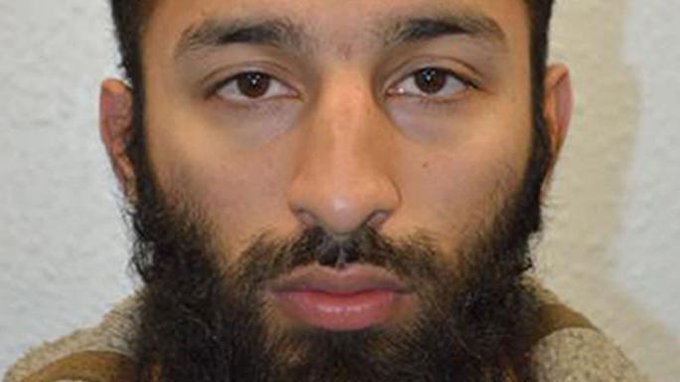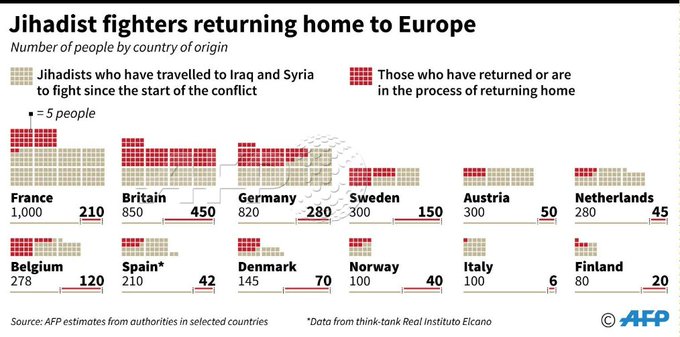
A diplomatic Twitter spat occurred yesterday after President Trump retweeted three videos from a leader of the far-right Britain First party. UK Prime Minister Theresa May responded by saying:
It was wrong for the president to have done this.
Trump replied by reminding Prime Minister May that her country's problem with radical Islam and terrorism is of far greater importance than his retweets:
Leave aside the fact that two of the three videos Trump retweeted are EXACTLY as they were represented, yet were still deemed by the international media to be "inflammatory." You can also ignore that some of those same media outlets actually reported on the videos when they first emerged. Because, just yesterday, a 17-year-old was arrested in Wales for planning an ISIS-inspired car ramming attack in Cardiff:
The cold reality is that May's country is indeed -- per an official statement from her administration, even -- overrun with tens of thousands of radical Islamists and hundreds of former ISIS fighters. The stunning admission came recently from British intelligence, and was then confirmed by UK Home Secretary Amber Rudd. They had identified a staggering 23,000 radical Islamists in the UK who could potentially conduct terror attacks:
That public admission of the scope of the problem came only after the Manchester arena suicide bombing in May following an Arianna Grande concert, which left 22 dead and 250 injured.
The Times reported:
Intelligence officers have identified 23,000 jihadist extremists living in Britain as potential terrorist attackers, it emerged yesterday.The scale of the challenge facing the police and security services was disclosed by Whitehall sources after criticism that multiple opportunities to stop the Manchester bomber had been missed.About 3,000 people from the total group are judged to pose a threat and are under investigation or active monitoring in 500 operations being run by police and intelligence services.The 20,000 others have featured in previous inquiries and are categorised as posing a “residual risk”.
Those MI5 figures were confirmed by Home Minister Rudd the following day on Andrew Marr's BBC show:
However, as I reported here at PJ Media, one of the UK's top former intelligence officials disputes these numbers as being far too low.
Col. Richard Kemp, former chairman of the Cobra Intelligence Group that briefed the British government on secret intelligence, told BBC Newsnight that the 23,000 jihadists MI5 officials have publicly admitted to living in the UK "may be the tip of the iceberg":
It was only last week -- months after the Manchester suicide bombing -- that officials announced that surveillance was being increased for the 23,000+ who were already on the UK intelligence radar:
In truth, these reports are all security kabuki. The sheer size of the problem makes any detailed surveillance of these staggering numbers absolutely impossible. For example, the MI5 estimates show 3,000 individuals considered a threat are under active investigation in 500 operations. U.S. officials have said publicly that the FBI has 1,000 ISIS-related cases including all 50 states. In either situation, the ability of law enforcement to conduct any intensive surveillance on 3,000 or even 1,000 cases is a fantasy.
For evidence of this, let's review the four UK terror attacks that occurred just this year in Westminster, Manchester, London Borough, and Parsons Green. These jihadists were able to basically strike at will -- yet in each of these four UK terror cases, most of the suspects involved WERE ALREADY KNOWN to law enforcement and intelligence.
I've termed this phenomenon "Known Wolf" terror, as virtually all terror suspects in the West were previously known to authorities:
Westminster: Khalid Masood was not only the spokesman for the extremist Luton Islamic Centre, but was also friends with the December 2010 Stockholm suicide bomber Taimur Abdulwahab al-Abdaly, whom he had met at the mosque. Masood had previously been investigated by MI5.Manchester: Suicide bomber Salman Abedi had been known to British intelligence, but had been deemed "not a threat."London Borough: One of the three attackers, Khurram Butt, had not only been referred to authorities twice for his extremism, he had appeared in a Channel 4 documentary on ISIS supporters in the U.K. Further, he had actually been stopped from trying to join ISIS in Syria, and authorities had deemed him "potentially one of the most deadly extremists in the U.K."The second attacker, Moroccan/Libyan Rachid Redouane, had been denied asylum by the UK in 2009.The third attacker, Youssef Zaghba, an Italian citizen born in Morocco, had been stopped in Bologna on his way to join ISIS in Syria. He literally told interrogators: "I am going to be a terrorist."Parsons Green: 18-year-old Iraqi refugee Ahmed Hassan, who attempted to bomb a London Underground train, had not only been stopped by Metro Police two weeks before the attack at the Parsons Green station, but was part of the UK's PREVENT "de-radicalization" program.
Both Salman Abedi and Rachid Redouane had fought with Western-backedLibyan rebels against Gaddafi -- two examples of terrorism "blowback."
Now, of those 23,000 known radical Islamists in the UK, at least 400 are known to be former ISIS fighters who have been allowed to return:
At least 400 more UK ISIS fighters' whereabouts are unknown:
Who is watching the 400 known ones? When Piers Morgan put that question to London Mayor Sadiq Khan, he had no good answer:
Here's a shocking statistic: more UK Muslims fought with terror groups in Syria than there are Muslims enlisted in UK military forces:
Of course, it's not just ISIS returnees that are the problem:
So what do UK officials intend to do about these returning terrorist fighters? Arrests? Prosecutions?
As I reported here at PJ Media last month, nothing:
President Trump is right. PM May and the UK have plenty more to worry about than his retweets.













No comments:
Post a Comment